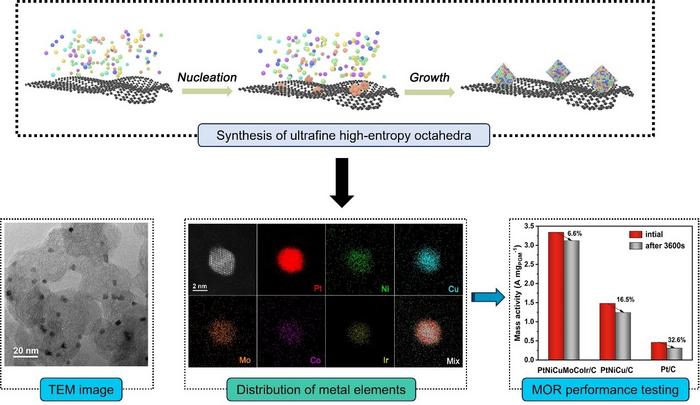In a significant development in renewable energy technology, a research team led by Professor ZHANG Tierui from the Technical Institute of Physics and Chemistry of the Chinese Academy of Sciences (CAS) has made remarkable advancements in the field of fuel cell catalysts. Their latest work focuses on the development of ultrafine platinum-based high-entropy alloy (HEA) octahedra, which not only enhances the efficiency of methanol oxidation reactions but also addresses the persistent issue of catalyst deactivation due to poisoning. This breakthrough has the potential to reshape the future of direct methanol fuel cells (DMFCs) and addresses the growing demand for efficient energy conversion technologies.
Fuel cells have emerged as a promising alternative to traditional fossil fuels due to their clean energy generation capabilities. Unlike combustion-based energy systems, fuel cells convert chemical energy directly into electrical energy, resulting in zero emissions at the point of use. Among various liquid fuels, methanol stands out due to its high energy density, safety characteristics, and ease of transport. However, leveraging methanol in fuel cells has been problematic because of the rapid deactivation of catalysts during oxidation reactions, primarily caused by poisoning species like carbon monoxide. The buildup of these poisons on the catalyst surface can severely hinder reaction performance, necessitating innovative solutions to enhance catalyst resilience and functionality.
Understanding these challenges, Professor ZHANG’s team targeted the design of a new class of catalysts. The researchers focused on creating ultrafine HEA octahedra that would present a stable and catalytically active surface for the methanol oxidation reaction. Traditional platinum catalysts, while effective, suffer from high surface energies that lead to instability and aggregation at the nanoscale. By engineering the metallic alloy composition and structural configuration, the team successfully reduced the surface energy of their octahedral nanostructures, leading to enhanced stability and, therefore, increased efficacy in catalytic performance.
What makes these platinum-based HEA octahedra particularly intriguing is their unique structural properties. By employing a multi-elemental approach, this new catalyst design achieved remarkable reductions in size, with ultrafine nano-octahedra measuring less than 3 nanometers in edge length. In their experiments, the team found that increasing the number of metal constituents produced a corresponding decrease in the average dimensions of the octahedra. Intriguingly, when they synthesized a senary alloy comprising six different metal elements, the resulting average edge length shrank to just 2.8 nanometers, showcasing an unprecedented level of engineering at the nanoscale.
The electrochemical performance of these HEA octahedra was rigorously tested, revealing a synergistic effect that resulted from the interaction of multiple metallic elements within the alloy. This innovative approach fine-tuned the electronic structure of platinum, thereby improving its catalytic activity and poisoning resistance during the methanol oxidation reaction. Notably, the senary alloy demonstrated superior activity compared to both conventional ternary alloys—a composition containing three metal elements—and the widely used commercial platinum-on-carbon (Pt/C) catalysts.
In practical terms, these innovative catalysts represent a major leap toward achieving efficient, durable, and sustainable energy conversion systems. The implications of such advancements transcend just fuel cells; they signal a concerted effort in the scientific community to replace outdated fossil fuel technologies with cleaner alternatives. As the global community increasingly prioritizes environmental sustainability, the integration of high-performance catalysts into renewable energy systems becomes ever more critical.
This groundbreaking research has been published in the peer-reviewed journal, Matter, demonstrating the potential impact of ultrafine HEA catalysts on the renewable energy landscape. The work not only contributes to our understanding of catalysis but also provides a practical solution to one of the significant challenges facing methanol fuel cell development today. As researchers continue to explore the boundaries of materials science and chemistry, the findings of ZHANG’s team epitomize the synergy between innovation and practical application in addressing global energy challenges.
The implications of these findings resonate particularly within the framework of the National Key Projects for Fundamental Research and Development of China, as well as various funding bodies including the National Natural Science Foundation of China, the Beijing Natural Science Foundation, and the Youth Innovation Promotion Association of CAS. Such support underscores the importance of interdisciplinary collaboration in advancing technologies that hold promise for sustainable energy solutions.
In conclusion, the future of clean energy technology may very well hinge on the refinement and deployment of advanced catalysts, like the ultrafine platinum-based HEA octahedra developed by Professor ZHANG’s team. With ongoing research and development efforts centered on optimizing these materials, the prospect of more efficient, environmentally friendly energy solutions is not merely a hope; it is becoming a tangible reality. As the energy landscape continues to evolve, the sustained effort to innovate and implement cutting-edge technologies will be crucial in meeting global energy demands while preserving environmental integrity.
Subject of Research: Development of ultrafine platinum-based high-entropy alloy octahedra for methanol oxidation reactions.
Article Title: Ultrafine Pt-based High Entropy Alloy Nanooctahedra Deliver Enhanced Methanol Oxidation Reaction Activity and Durability.
News Publication Date: 8-Apr-2025.
Web References: DOI: 10.1016/j.matt.2025.102096
References: Not applicable.
Image Credits: Credit: ZHANG’s group.
Keywords
Fuel cells, methanol oxidation, platinum-based catalysts, high-entropy alloys, electrochemistry, renewable energy, environmental sustainability, catalytic efficiency, nanoscale engineering, chemical energy conversion, energy technology.




